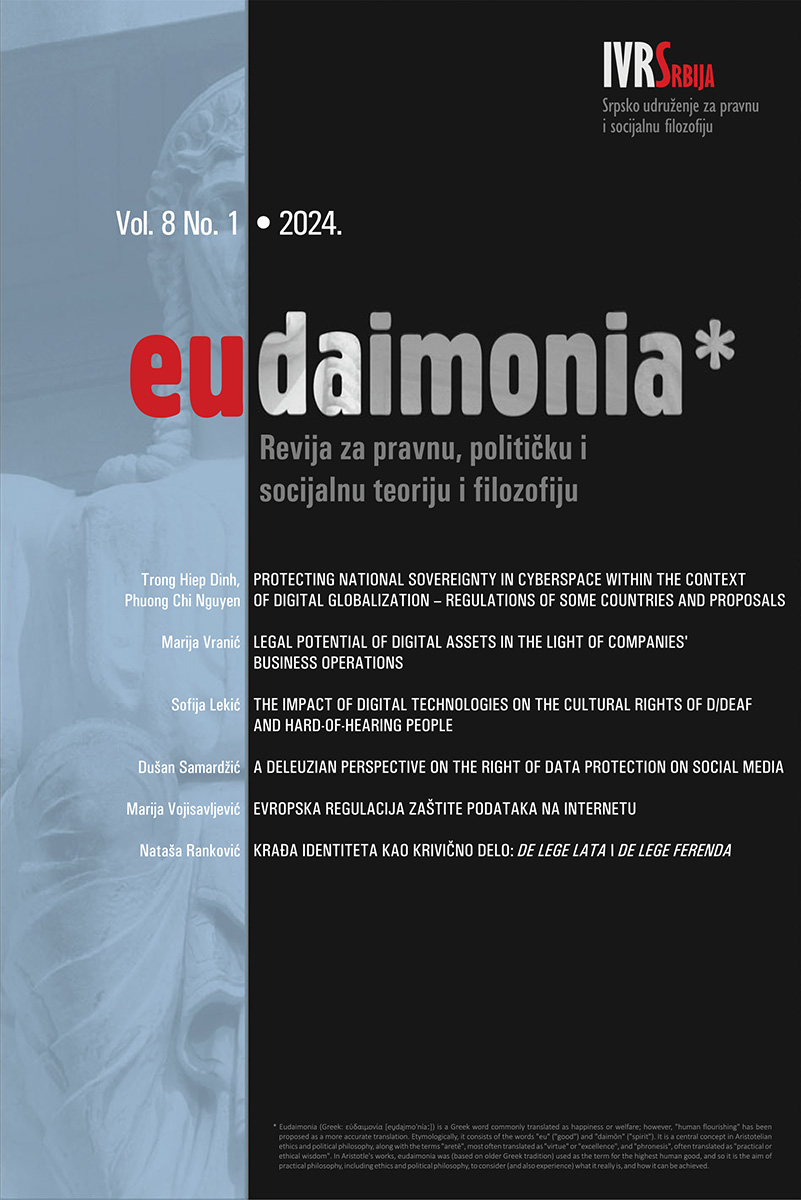PROTECTING NATIONAL SOVEREIGNTY IN CYBERSPACE WITHIN THE CONTEXT OF DIGITAL GLOBALIZATION - REGULATIONS OF SOME COUNTRIES AND PROPOSALS
DOI:
https://doi.org/10.51204/IVRS_24101AKeywords:
Cyberspace Security, Digital Globalization, International law, National Law, National SovereigntyAbstract
The explosive growth of digital technologies is creating a virtual and borderless environment, which is so-called “cyberspace”. In addition to serving as a platform that allows digital communication, information sharing, and online activities to take place, cyberspace carries various risks and vulnerabilities that can pose significant challenges to individuals, organizations, and even the nation. Throughout history, international law has built the concept of state sovereignty based on material aspects. However, digital globalization has significantly changed social relations, challenging important legal concepts that underlie international relations, including the concept of national sovereignty. Therefore, the issue of national sovereignty in cyberspace needs to be studied more carefully, thereby seeking appropriate solutions to protect national sovereignty in cyberspace.
References
Adams, Jackson, Mohamad Albakajai. 2016. Cyberspace, A New Threat to the Sovereignty of the State. https://core.ac.uk/reader/146502700 (last visited October 20, 2023).
Army News Service. 2009. Next war will begin in cyberspace, experts predict. https://www.army.mil/article/17561/next_war_will_begin_in_cyber- space_experts_predict (last visited 31 August, 2023).
Association of Southeast Asian Nations (ASEAN). 2021. Asean Cybersecurity Cooperation Strategy (2021–2025). https://asean.org/wp-content/uploads/2022/02/01-ASEAN-Cybersecurity-Cooperation-Pa-per-2021–2025_final-23–0122.pdf (last visited November 5, 2023).
Association of the U.S Army. 2008. The 2008 National Defense Strategy: Implications for the U.S Army. https://www.ausa.org/sites/default/files/TBIP-2008-The-2008-National-Defense-Strategy-Implications-for-the-Unit- ed-States-Army.pdf (last visited October 20, 2023).
Ayers, Cynthia E. 2016. Rethinking Sovereignty in the Context of Cyberspace. https://media.defense.gov/2023/Oct/02/2003312498/-1/1/0/RE-THINKING%20SOVEREIGNTY.PDF (last visited October 25, 2023).
Allison, Pytlak, Shreya, Lad. 2024. The UN Security Council Discusses Cyber Threats to International Security. https://www.stimson.org/2024/un-security-council-cyber-threats-to-international-security/ (last visited April 15, 2024).
Barlow, John Perry. 1996. A Declaration of the Independence of Cyberspace. https://www.eff.org/cyberspace-independence (last visited October 25, 2023).
Binxing, Fang. 2018. Cyberspace Sovereignty Reflections on Building a Community of Common Future in Cyberspace. Beijing: Science Press Beijing.
Broad, William. 2010. Report Suggests Problems With Iran’s Nuclear Effort. NY Times, https://www.nytimes.com/2010/11/24/world/middleeast/24nuke.html, NYTimes (last visited 31 August, 2023).
Cyberspace Administration of China. 2015. The Cyber Perception of President Xi Jinping: To build a cyber power, and let the development benefit the people. http://www.cac.gov.cn/2015–12/10/c_1117414086.htm (last visited November 5, 2023).
DeWeese, Geoffrey S. “Anticipatory and Preemptive Self-Defense in Cyberspace: The Challenge of Imminence” (2015) 7th International Conference on Cyber Conflict. https://ccdcoe.org/uploads/2018/10/Art-06-Anticipatory-and-Preemptive-Self-Defense-in-Cyberspace-The-Chal-lenge-of-Imminence.pdf (last visited October 25, 2023).
Digital and Cyberspace Policy Program and Net Politics. The Sinicization of Russia’s Cyber Sovereignty Model. https://www.cfr.org/blog/sinicization-russias-cyber-sovereignty-model (last visited October 30, 2023).
European Commission. 2022. European Cybersecurity Investment Platform. https://www.eib.org/attachments/lucalli/20220206-european-cyberse-curity-investment-platform-en.pdf (last visited October 4, 2023).
Harrison Dinniss, Heather. 2012. Cyber Warfare and the Laws of Wars, New York: Cambridge University Press.
Huff, Toby E. 2001. Globalization and the Internet: Comparing the Middle Eastern and Malaysian Experiences. Middle East Journal 55: 439–458.
Koh, Harold. 2012. Remarks at the U.S. Cyber Command Inter-Agency Legal Conference. http://opiniojuris.org/2012/09/19/harold-koh-on-inter-national-law-in-cyberspace/, https://perma.cc/MJS5-XJVA (last visited October 25, 2023).
Kumar, Ankit. 2023. Internet Censorship in China: The Struggle to Swat “Flies” Away. https://icsin.org/blogs/2023/10/10/internet-censorship-in-chi-na-the-struggle-to-swat-flies-away-2/ (last visited November 5, 2023).
Lewis, James Andrew. 2010. Sovereignty and the role of government in cyberspace. The Brown Journal of World Affairs 16: 55–65.
Ministry of Information and Communications. 2023. The UN discusses cyber attacks on critical infrastructure. https://mic.gov.vn/pages/tintuc/printpage.aspx?tintucID=158845 (last visited November 5, 2023).
Moynihan, Harriet. 2019. The Application of International Law to State Cyberattacks Sovereignty and Non-intervention. Chatham House report. https://www.chathamhouse.org/2019/12/application-international-law-state-cyberattacks/1-introduction (last visited October 20, 2023).
Nakashima, Ellen. 2013. U.S. and Russia sign pact to create communication link on cyber security. The Washington Post. https://www.washingtonpost.com/world/national-security/us-and-russia-sign-pact-to-create-communication-link-on-cyber-security/2013/06/17/ca57ea04-d788– 11e2–9df4–895344c13c30_story.html (last visited October 30, 2023).
Nguyen, Tien Duc, Thi Thu Thuy Tran. 2019. Cyber attacks and the principle of prohibition of the use of force in international law. https://iusco-gens-vie.org/2019/04/20/131/#_ftn14 (last visited October 4, 2023).
Permanent Delegation of the Socialist Republic of Vietnam in New York – United States. 2019. The UN Security Council discussed the issue of cyberspace stability. https://vnmission-newyork.mofa.gov.vn/vi-vn/News/ConsulateNews/Trang/Hội-đồng-Bảo-an-LHQ-thảo-luận-vấn-đề-ổn-định-không-gian-mạng.aspx?p=38 (last visited November 5, 2023).
President of the U.S. 2018. National Cyber Strategy of the U.S of America. https://trumpwhitehouse.archives.gov/wp-content/uploads/2018/09/Nation-al-Cyber-Strategy.pdf (last visited October 25, 2023).
Roscini, Marco. 2012. Cyber Operations and the Use of Force in International Law, Oxford: Oxford University Press.
Schmitt, Michael. 2022. The United Kingdom on International Law in Cyberspace https://www.ejiltalk.org/the-united-kingdom-on-international-law-in-cyberspace/ (last visited October 30, 2023).
Schmitt, Michael. 2017. Tallinn Manual 2.0 on the International Law applicable to Cyber Operations. Cambridge University Press.
Schneider, Gary P. 2013. E-Business. India: Cengage India.
Schultz, David, Nataliya Moroz. 2022. Cyberspace and the Future of International Law and Politics. International Policy Digest. https://intpo-licydigest.org/cyberspace-and-the-future-of-international-law-and-politics/ (last visited October 20, 2023).
Shen, Yi. 2014. Transform and construction: the design of national cybersecurity strategy and the capacity build in a post-Snowden age. China Information Security 5: 41–43.
United Nations. General Assembly. 2013. UN GGE Report of the Group of Governmental Experts on Developments in the Field of Information and Telecommunications in the Context of International Security. https://dig.watch/wp-content/uploads/A_68_98_E.pdf (last visited October 15, 2023).
Vietnam News. 2021. Sovereignty over cyberspace an important part of national sovereignty: official. https://vietnamnews.vn/society/1095123/sovereignty-over-cyberspace-an-important-part-of-national-sovereignty-official.html, (last visited November 5, 2023).
Xinhua Net. 2014 Address of President Xi Jinping in the Brazil Congress. http://news.xinhuanet.com/world/2014–07/17/c_1111665403.htm. (last visited November 5, 2023).


